Connect With Us
Items filtered by date: August 2022
Accessory Navicular Syndrome
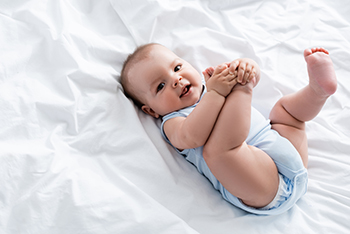
The accessory navicular is an extra bone or piece of cartilage on the inner side of the foot, just above the arch. This is congenital, or present at birth. Most people do not have this as it is not part of the normal bone structure. People who have this condition are often unaware that they have it, especially if it does not cause problems. However, some people with this extra bone develop accessory navicular syndrome, which is painful. The pain comes from aggravation to the bone or posterior tibial tendon that can come from trauma (like a foot or ankle sprain), chronic irritation (from friction from shoes rubbing against the extra bone), or prolonged activity or overuse. Many of those with this affliction also have flat feet or fallen arches. Having flat feet puts more strain on the posterior tibial tendon, and this can cause inflammation or irritation of the accessory navicular. Symptoms of this syndrome usually appear in adolescence when the bones are mature and cartilage develops into bone. Signs and symptoms of this condition include a visible bony prominence with redness or swelling on the inside of the foot, just above the arch, and a vague pain or throbbing in the midfoot and arch areas, usually after periods of activity. If you or your child have pain in this area of the foot, please see a podiatrist for proper diagnosis and appropriate treatment.
Congenital foot problems require immediate attention to avoid future complications. If you have any concerns, contact one of our podiatrists of The Podiatry Center, PC. Our doctors can provide the care you need to keep you pain-free and on your feet.
Congenital foot problems are deformities affecting the feet, toes, and/or ankles that children are born with. Some of these conditions have a genetic cause while others just happen. Some specific foot ailments that children may be born with include clubfeet, polydactyly/macrodactyly, and cleft foot. There are several other foot anomalies that can occur congenitally. What all of these conditions have in common is that a child may experience difficulty walking or performing everyday activities, as well as trouble finding footwear that fits their foot deformity. Some of these conditions are more serious than others. Consulting with a podiatrist as early as possible will help in properly diagnosing a child’s foot condition while getting the necessary treatment underway.
What are Causes of Congenital Foot Problem?
A congenital foot problem is one that happens to a child at birth. These conditions can be caused by a genetic predisposition, developmental or positional abnormalities during gestation, or with no known cause.
What are Symptoms of Congenital Foot Problems?
Symptoms vary by the congenital condition. Symptoms may consist of the following:
- Clubfoot, where tendons are shortened, bones are shaped differently, and the Achilles tendon is tight, causing the foot to point in and down. It is also possible for the soles of the feet to face each other.
- Polydactyly, which usually consists of a nubbin or small lump of tissue without a bone, a toe that is partially formed but has no joints, or an extra toe.
- Vertical talus, where the talus bone forms in the wrong position causing other bones in the foot to line up improperly, the front of the foot to point up, and the bottom of the foot to stiffen, with no arch, and to curve out.
- Tarsal coalition, when there is an abnormal connection of two or more bones in the foot leading to severe, rigid flatfoot.
- Cleft foot, where there are missing toes, a V-shaped cleft, and other anatomical differences.
- Macrodactyly, when the toes are abnormally large due to overgrowth of the underlying bone or soft tissue.
Treatment and Prevention
While there is nothing one can do to prevent congenital foot problems, raising awareness and receiving neonatal screenings are important. Early detection by taking your child to a podiatrist leads to the best outcome possible.
If you have any questions please feel free to contact our office located in Millburn, NJ . We offer the newest diagnostic tools and technology to treat your foot and ankle needs.
Wounds That Don't Heal Need to Be Checked
Benefits of Following a Regular Foot Care Routine
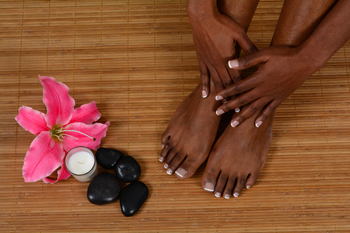
We can go to professional salons to have our feet pampered but that can be costly. If you want to indulge your feet more often, you can follow a foot care routine in the comfort of your home which will be much cheaper. While we depend on our feet to get us around and hold us up for a lifetime, we tend to neglect them compared to the skin on our faces. Ignoring foot care can come with the risk of infections, corns, cracked heels, sore feet, blisters, and foot odor. Regular foot care includes examining your feet regularly to see if you have cuts, bruises, or inflammation. It also includes washing and drying feet daily, applying a moisturizer, and trimming the toenails properly by cutting them straight across and using a nail file to round the edges. Well-fitting shoes and socks must be worn too. If you notice your feet are hard and dry, you can soften the skin by soaking them in hot water and using Epsom salt as an exfoliator. If you have questions about how to properly care for your feet or if you sustain an injury, consult with a podiatrist who can answer any questions as well as provide a diagnosis and treatment plan.
Everyday foot care is very important to prevent infection and other foot ailments. If you need your feet checked, contact one of our podiatrists from The Podiatry Center, PC. Our doctors can provide the care you need to keep you pain-free and on your feet.
Everyday Foot Care
Often, people take care of their bodies, face and hair more so than they do for their feet. But the feet are a very important aspect of our bodies, and one that we should pay more attention to. Without our feet, we would not be able to perform most daily tasks.
It is best to check your feet regularly to make sure there are no new bruises or cuts that you may not have noticed before. For dry feet, moisturizer can easily be a remedy and can be applied as often as necessary to the affected areas. Wearing shoes that fit well can also help you maintain good foot health, as well as making it easier to walk and do daily activities without the stress or pain of ill-fitting shoes, high heels, or even flip flops. Wearing clean socks with closed shoes is important to ensure that sweat and bacteria do not accumulate within the shoe. Clean socks help to prevent Athlete’s foot, fungi problems, bad odors, and can absorb sweat.
If you have any questions please feel free to contact our office located in Millburn, NJ . We offer the newest diagnostic and treatment technologies for all your foot and ankle needs.
How Bad Are High Heels for My Feet?
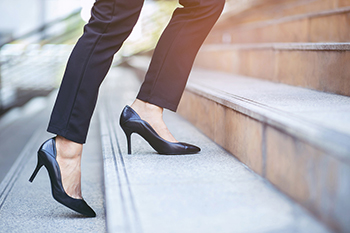
Research has shown that one third of women who frequently wear high heels have fallen while wearing them. High heels may be the cause of foot problems in women, and some may suffer permanent damage. The foot condition that is called hammertoe may develop, and this may happen when the toes do not have adequate room to move freely in. Additionally, many women can get ingrown toenails, which can occur when the toe rubs against the top of the shoe. The foot can be forced into an unnatural shape when the heels are two inches or higher, and this may alter the foot structure. The foot may slide forward, causing the weight of the body to redistribute, and the body may tilt forward. This can wreak havoc on the overall body, and the posture may be negatively affected. There are many women who enjoy wearing high heels, and there are shoes that can be worn that are safer on the feet and body. These can include choosing shoes that have a lower heel, wearing soft insoles inside the shoe, and alternating shoes worn from one day to the next. If you would like additional information about how high heels can affect the feet, please consult with a podiatrist who can answer any questions you may have.
High heels have a history of causing foot and ankle problems. If you have any concerns about your feet or ankles, contact one of our podiatrists from The Podiatry Center, PC. Our doctors can provide the care you need to keep you pain-free and on your feet.
Effects of High Heels on the Feet
High heels are popular shoes among women because of their many styles and societal appeal. Despite this, high heels can still cause many health problems if worn too frequently.
Which Parts of My Body Will Be Affected by High Heels?
- Ankle Joints
- Achilles Tendon – May shorten and stiffen with prolonged wear
- Balls of the Feet
- Knees – Heels cause the knees to bend constantly, creating stress on them
- Back – They decrease the spine’s ability to absorb shock, which may lead to back pain. The vertebrae of the lower back may compress.
What Kinds of Foot Problems Can Develop from Wearing High Heels?
- Corns
- Calluses
- Hammertoe
- Bunions
- Morton’s Neuroma
- Plantar Fasciitis
How Can I Still Wear High Heels and Maintain Foot Health?
If you want to wear high heeled shoes, make sure that you are not wearing them every day, as this will help prevent long term physical problems. Try wearing thicker heels as opposed to stilettos to distribute weight more evenly across the feet. Always make sure you are wearing the proper shoes for the right occasion, such as sneakers for exercising. If you walk to work, try carrying your heels with you and changing into them once you arrive at work. Adding inserts to your heels can help cushion your feet and absorb shock. Full foot inserts or metatarsal pads are available.
If you have any questions please feel free to contact our office located in Millburn, NJ . We offer the newest diagnostic and treatment technologies for all your foot and ankle needs.
It's Time for Beautiful Feet
Heel Pain, Plantar Fasciitis, and Obesity May Be Connected
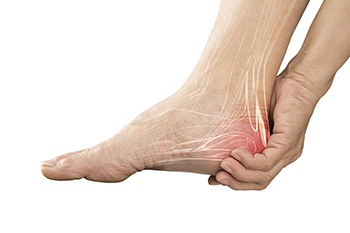
Research has indicated there is a large percentage of Americans that are considered to be obese. This condition is known to increase the risk of many physical ailments, including heel pain and plantar fasciitis. It can happen as a result of the added impact the feet endure from completing daily activities, and this may possibly damage the plantar fascia. This is defined as the band of tissue that runs along the bottom of the foot, and connects the heels to the toes. Walking can become difficult, and heel pain may increase. Partial relief may be found when a low-impact exercise routine is frequently followed. This type of exercise can include swimming, water aerobics or cycling, and some patients can feel the benefits of practicing yoga and Pilates as part of their exercise regime. This, along with eating foods that are healthy, are often effective ways to lose weight, which may relieve some of the pressure on the plantar fascia. If you have any type of foot pain, and feel your weight may be a contributing factor, please speak with a podiatrist who can treat foot conditions, and offer additional solutions for weight loss.
Obesity has become very problematic at this point in time and can have extremely negative effects on the feet. If you’re an obese individual and are concerned about your feet, contact one of our podiatrists from The Podiatry Center, PC. Our doctors can provide the care you need to keep you pain-free and on your feet.
Obesity and Your Feet
Since your feet are what support your entire weight when standing, any additional weight can result in pain and swelling. Being overweight is one of the main contributors to foot complications.
Problems & Complications
Extra Weight – Even putting on just a few extra pounds could create serious complications for your feet. As your weight increases, your balance and body will shift, creating new stresses on your feet. This uneven weight distribution can cause pain, even while doing the simplest tasks, such as walking.
Diabetes – People who are overweight are at serious risk of developing type-2 diabetes, which has a drastic impact on the health of your feet. As you get older, your diabetes might worsen, which could lead to loss of feeling in your feet, sores, and bruises. You could also become more prone to various infections.
Plantar fasciitis – Pressure and stress that is placed on muscles, joints, and tendons can trigger plantar fasciitis, which is an inflammation of tissue that forms along the bottom of the foot.
If you have any questions please feel free to contact our office located in Millburn, NJ . We offer the newest diagnostic and treatment technologies for all your foot and ankle needs.
Possible Reasons for Achilles Tendon Pain
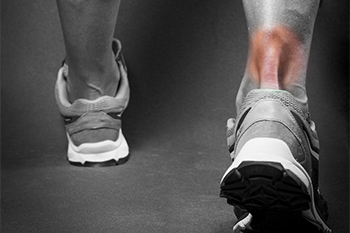
The Achilles tendon main function is to connect the heel to the calf. An Achilles tendon injury can occur from overuse, or because of a fall. If the tendon tears, it is referred to as a rupture, and is common among those who are active or athletic. This can cause severe pain and discomfort, often making it difficult to walk. There are additional reasons why patients may experience Achilles tendon pain. These include pyoneritides, which is considered to be a form of tendinitis, an infection caused by bacteria, or possibly from fatty deposits in the tendon. Osteoarthritis has been known to cause pain in the Achilles tendon, and it may be a result of a loss of cartilage. Mild relief may be found when performing specific stretches. These include standing on a step and lowering one heel at a time until a gentle stretch is felt. Practicing toe curls can also be an effective exercise, and this is done by bending the knee while curling the toes up, and holding for several seconds. If you would like to know more about Achilles tendon injuries or how to perform exercises that can help this type of pain, please schedule an appointment with a podiatrist.
Achilles tendon injuries need immediate attention to avoid future complications. If you have any concerns, contact one of our podiatrists of The Podiatry Center, PC. Our doctors can provide the care you need to keep you pain-free and on your feet.
What Is the Achilles Tendon?
The Achilles tendon is a tendon that connects the lower leg muscles and calf to the heel of the foot. It is the strongest tendon in the human body and is essential for making movement possible. Because this tendon is such an integral part of the body, any injuries to it can create immense difficulties and should immediately be presented to a doctor.
What Are the Symptoms of an Achilles Tendon Injury?
There are various types of injuries that can affect the Achilles tendon. The two most common injuries are Achilles tendinitis and ruptures of the tendon.
Achilles Tendinitis Symptoms
- Inflammation
- Dull to severe pain
- Increased blood flow to the tendon
- Thickening of the tendon
Rupture Symptoms
- Extreme pain and swelling in the foot
- Total immobility
Treatment and Prevention
Achilles tendon injuries are diagnosed by a thorough physical evaluation, which can include an MRI. Treatment involves rest, physical therapy, and in some cases, surgery. However, various preventative measures can be taken to avoid these injuries, such as:
- Thorough stretching of the tendon before and after exercise
- Strengthening exercises like calf raises, squats, leg curls, leg extensions, leg raises, lunges, and leg presses
If you have any questions please feel free to contact our office located in Millburn, NJ . We offer the newest diagnostic tools and technology to treat your foot and ankle needs.
Blog Archives
- June 2025
- May 2025
- April 2025
- March 2025
- February 2025
- January 2025
- December 2024
- November 2024
- October 2024
- September 2024
- August 2024
- July 2024
- June 2024
- May 2024
- April 2024
- March 2024
- February 2024
- January 2024
- December 2023
- November 2023
- October 2023
- September 2023
- August 2023
- July 2023
- June 2023
- May 2023
- April 2023
- March 2023
- February 2023
- January 2023
- December 2022
- November 2022
- October 2022
- September 2022
- August 2022
- July 2022
- June 2022
- May 2022
- April 2022
- March 2022
- February 2022
- January 2022
- December 2021
- November 2021
- October 2021
- September 2021
- August 2021
- July 2021
- June 2021
- May 2021
- April 2021
- March 2021
- February 2021
- January 2021
- December 2020
- November 2020
- October 2020
- September 2020
- August 2020
- July 2020
- June 2020
- May 2020
- April 2020
- March 2020
- February 2020
- January 2020
- December 2019
- November 2019
- October 2019
- September 2019
- August 2019
- July 2019
- June 2019
- May 2019
- April 2019
- March 2019
- February 2019
- January 2019
- December 2018
- November 2018
- October 2018
- September 2018
- August 2018
- July 2018
- June 2018
- May 2018
- April 2018
- March 2018
- February 2018
- January 2018
- December 2017
- November 2017
- October 2017
- September 2017
- August 2017
- July 2017
- June 2017
- May 2017
- April 2017
- March 2017
- February 2017
- January 2017
- December 2016
- November 2016
- October 2016
- September 2016
- August 2016
- July 2016
- June 2016
- May 2016
- April 2016
- March 2016
- February 2016
- January 2016
- December 2015
- November 2015
- October 2015
- September 2015
- August 2015
- July 2015
- June 2015
- May 2015
- January 2014
- December 2013
- November 2013
- October 2013
- September 2013
- August 2013
- July 2013
- June 2013
- May 2013
- April 2013
- March 2013
- February 2013
- January 2013
- December 2012
- November 2012
- October 2012
- September 2012
- August 2012
- July 2012
- June 2012


